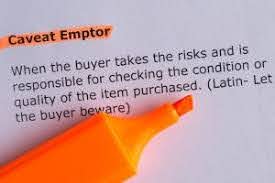Caveat Emptor, or “let the buyer beware?
I really hate to write this post. We are taught not to criticize other dentists but given what I am seeing when some of my patients choose to leave the fold and then return can leave me deeply disturbed. Twice in the last 30 days patients have returned to my practice after seeking care closer to home, only to find that they were diagnosed with five or more cavities that need restoring.
Upon examination and reviewing their radiographs I could not find the need for any of their diagnosed fillings.
We dentists are taught not to criticize other colleagues, but some of the clinics that my patients have gone to are guilty of violating the public's trust. After all, as dentists we have a legal and moral obligation not to perform unnecessary procedures. It saddens me to think that some of my colleagues are more concerned with paying their bills than doing the right thing
Ethics is currently a topic of concern for many health professionals today and dentistry is not an exception. The fact is that medical and dental professionals have an obligation do no harm to their patients and performing unnecessary tests and unneeded procedures is not ethical, even if the institution or business they are working strongly encourages this. Unfortunately, many physicians and dentists are employees of large organizations ( hospitals or large group practices) that set the policies and employees who do not fully cooperate may risk losing their jobs.
Although I am currently self employed, when I started out in dentistry I worked at a number of different dental offices. Some had some employees who engaged in what I considered to be unethical treatment of patients, but most of the time, I felt I could still deliver appropriate care for my own patients ( even in these settings).There was at least one instance where I chose to quit my job, rather than continue working, because I didn't want to be associated that practice anymore. If I remained, I would be have knowingly been involved with my employer's unethical treatment of our shared patients and having no job seemed a better choice than my continued involvement with his practice.
The take home message for readers is that if you have long standing relationship with a dentist, this is probably not the time to make a switch, without a good reason... switching horses in midstream is never a good plan and going to a new dentist without a good reason is probably a potentially poor choice. Not all dentists are the same and evidently having a dental license doesn't ensure that a dental colleague will exhibit ethical behavior.
At least part of the problem is that employees have a change in their insurance plan and their dentist is no longer in network. They want to go to an in network dentist and are willing to go to a new dentist who accepts their insurance. Although this desire maybe understandable, there are inherent risks to changing dentists and if you choose to go that route you would best follow the principle of "Caveat Emptor" and don't be afraid of getting a second opinion prior to committing to an extensive plan for treatment.
from Ask Dr. Spindel - http://lspindelnycdds.blogspot.com/2020/11/caveat-emptor-or-let-buyer-beware.html - http://lspindelnycdds.blogspot.com/



Comments
Post a Comment